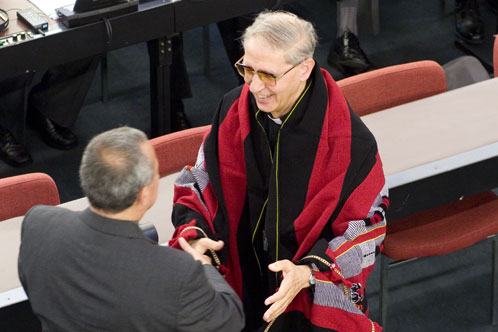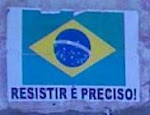Father Adolfo Nicolás
21-Feb-2007A conversation is an exchange. It leaves neither participant unchanged. This is something that Jesuits and other Christians working in Asia have found for centuries.
It’s been 46 years since Father Adolfo Nicolás first traveled to Japan as a missionary from Spain. His has been a long conversation, first in Japan, but also in Korea and more recently in the Philippines. It’s left him convinced that the West does not have a monopoly on meaning and spirituality, and can learn a lot from the experience of Asian cultures.
‘Asia has a lot yet to offer to the Church, to the whole Church, but we haven’t done it yet’, he says. ‘Maybe we have not been courageous enough, or we haven’t taken the risks that we should.’
It speaks volumes that when Father Nicolás talks about Asia, he uses the term ‘we’. As President of the Jesuit Conference of South East Asia and Oceania, he’s responsible for bringing Jesuits across the region together to think beyond their own countries, and confront challenges facing the globe.
The group he represents stretches from China and Myanmar in the west, to Korea in the north, Australia in the south, and Micronesia in the east. It brings together an incredibly diverse group of cultures and societies. From countries where Christianity has been strong in the past, but is on the wane, to places where Christians make up a small but vibrant minority.
Asked if people from a culture like Japan experience Ignatian Spirituality differently than those in the West, Father Nicolás says the experience was indeed different, but it had yet to be formulated.
‘I think the real experience of the Japanese is different. And it should be different. But the formulation continues to be very much a Western formulation’, he says.
A Japanese Jesuit, Father Katoaki, has recently translated and added comments on the book of the Exercises from a Japanese-Buddhist perspective. Father Adolfo says there has also been some discussion on whether the Exercises could be presented to non-Christians, and how that might occur.
‘The question is how to give the Ignatian experience to a Buddhist’, he says. ‘Not maybe formulated in Christian terms, which is what Ignatius asked, but to go to the core of the experience. What happens to a person that goes through a number of exercises that really turn a person inside-out. This is still for us a big challenge.’
While some work has been done comparing the Ignatian experience with that of Hindus, he says there hasn’t been a lot of work on finding similarities say in Japanese, Chinese or Korean cultures. He says East Asia has been more slow to do this in India, partly because the East Asians have a strong respect for tradition, and hence a respect for Christianity’s European traditions. However, the region’s remoteness also gives it more freedom to be creative.
‘There is more space for experimenting, for trying, for thinking and exchanging’, he says.
Essentially, he says the Exercises are about letting God guide people. This is something that those directing retreats have been wary of in the past, but something that is important when dealing with people from different cultural backgrounds.
‘The fact is, if God is guiding then the Japanese will be guided the Japanese way. And the same with the Chinese, and with people from other religions’, he says.
‘Then the director simply has to be perceptive, to see signs that here God is saying something that I don’t understand, and be humble enough to say continue as long as you keep sane and balanced etc.’
Others throughout Asia are dealing more directly with questions of cultural difference, working as missionaries in countries like Cambodia and Myanmar. Father Nicolás says he’s wary of missionaries who don’t enter into the lives of the people, but keep the patterns of their home cultures – Europe or Latin America - alive in their mind. For them, it’s not about exchange but about teaching and imposing orthodoxy.
‘Those who enter into the lives of the people, they begin to question their own positions very radically’, he says. ‘Because they see genuine humanity in the simple people, and yet they see that this genuine humanity is finding a depth of simplicity, of honesty, of goodness that does not come from our sources.’
That conversation must continue, if we are to learn from Asia and Asia is to learn from us.
‘That is a tremendous challenge, and I think it’s a challenge that we have to face. We don’t have a monopoly, and we have a lot to learn.’
By Michael McVeigh




Este comentário foi removido pelo autor.
ResponderEliminarFilomeno2006
ResponderEliminarTranscende-me essa sua observação... Porque é que é bom que seja um espanhol? É tão bom que seja um espanhol como um português, moçambicano, indiano, paquistanês ou uruguaio. Um Geral dos Jesuítas não tem nacionalidade! Como o Papa não tem!
Esperemos que o Espírito Santo ilumine o P. Adolfo Nicolás,sj e que desempenhe bem as funções para que foi escolhido. É tudo o que se espera.
España, Tierra de Santos y de ambiente sobrenatural......
ResponderEliminarFilomeno2006,
ResponderEliminarO Pedro Rapoula já fez o devido comentário. Fazendo uma achega ao último, o Japão, de onde, de facto, o P. Adolfo vem, também é uma terra de Santos e de ambiente sobrenatural. O Zen japonês, também fala muito de Deus e da Sua relação com a humanidade...
E, ainda na linha do Pedro, se conheceres a Companhia, os últimos Padres Gerais, quer o P. Arrupe, quer o P. Kolvenbach, tiveram (O P. Kolvenbach, ainda manterá) um grande sentido de universalidade. É o que se pede à Companhia: Ser um só Corpo para a Missão; e à Igreja: Ser una na diversidade.
Dou graças a Deus pelo P. Adolfo,sj. Do pouco que já li dele, acredito que trará "Boa Nova". :)
Con todos los respetos para los Señores Rapoula y Paulo, los jesuítas, como el Opus Dei, no dejan de ser la CREACIÓN DE UN ESPAÑOL, por lo que la tendencia es que a su cabeza se encuentre un compatricio de los fundadores.......Y los Papas italianos son los mejores: Pío XII, Juan XXIII.........
ResponderEliminar